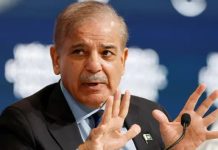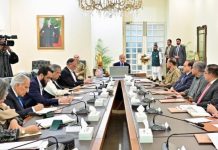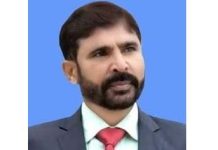At last, the mighty have spoken…our Pakistan
By
Qamar Bashir, Former Press Secretary for the President and Former Press Minister at the Pakistan Embassy in France
There were two noteworthy events in which the Chief of Army Staff’s clear vibes provided a breath of fresh air in the suffocating and politically charged atmosphere of the country.
The first was the Army Chief’s address to the closed-door session of the legislature, and the second was his meeting with retired generals. The excerpt of these meetings that was released to the public revealed the preferences, strategies, and plans of the army chief, which significantly calms the nation’s frayed nerves. First and foremost, the army chief was committed to combating violent terrorist remnants with full might.
The confused, half-baked, and ill-conceived counter terrorism policy of the past, which hinged on negotiating with the Taliban and bringing them back and settling them down, had failed miserably and resulted in spikes in terrorism attacks causing many deaths and injuries, sowing fear and disrupting society, undermining public confidence in government institutions, endangering the lives and liberties of our people, and delivering a severe blow to the law and order situation.
This skewed, ill-conceived, and perilous policy is buried for good thanks to the army chief’s clear narrative. This will help the country eliminate and eradicate this scourge and menace, will have a positive effect on our businesses, trade, and investments, will attract foreign investment in the country, and, most importantly, will give the people and the country a great sense of relief and security. The army chief realized correctly that negotiations with hard-core terrorists, indoctrinated, brainwashed fundamentalists, and criminals proselytize terrorists never succeeded in the past and would not work in the present or future. Similar to the negotiations between the Taliban and the United States in the late 1990s and early 2000s, which failed and led to the invasion of Afghanistan in 2001, such negotiations were doomed to fail and further terrify the nation. In 2013, our government’s negotiations with the Tehrik-i-Taliban Pakistan (TTP) failed because the TTP refused to submit to the constitution and law of the land. Similarly, negotiations between the United States and the Taliban led to the flight of the Afghanistan government, led by the President himself, and the Taliban seizing control of Kabul in August 2021. The policy of the past to co-opt, engage, and negotiate with hard-core criminals and fully indoctrinated, brainwashed terrorists is finally buried forever, indeed a great relief to the nation.
The army chief also informed the nation that there are no longer any restricted areas in the country. This is by no means a minor announcement; no-go zones signify the end of government authority where they begin. It indicates that these regions are unsafe and inaccessible, rife with conflict, high crime rates, and security threats that have a wide-ranging impact on society. People in these regions lack access to essential services, such as healthcare and education, and to basic necessities such as food and water, resulting in a decline in their quality of life and living conditions and an increase in poverty and inequality. No-go zones are characterized by providing safe havens for criminal and terrorist groups, planning and executing attacks, engaging in illicit activities such as drug trafficking or human trafficking, and undermining the rule of law and the authority of the state, thereby exacerbating security issues. They instill a sense of fear and uncertainty in both the affected communities and the broader population, eroding trust between citizens and the state and making it more challenging to address security challenges through peaceful means. The army chief’s announcement in this backdrop is positive and will undoubtedly restore security and stability to affected communities, paving the way for implementing long-term solutions and addressing the root causes of insecurity, such as poverty, inequality, and social exclusion.
The two most significant commitments were the army chief’s pledge to adhere to the constitution’s role and his resolve to stand with the legislature, executive, and judiciary in strict accordance with the constitution and the law of the land. Assuaging fears and rumors of a possible army takeover due to impending political polarization and constitutional and judicial crisis, which had previously served as an excuse for military leadership to roll back civilian rule and impose martial law.
The army chief’s statements are constitutionally and politically correct. His understanding is apt that the military must remain subservient to the constitution and avoid any political role in order to uphold the principles of democracy, separation of powers, stability, security, adherence to the rule of law, and international standing. The constitution stipulates that the military’s role is to defend the nation from external threats, not to govern. His determination to adhere to the constitution is commendable.
When the military intervenes in politics, it undermines the democratic principles that rely on civilian control of the government, as he has correctly recognized. The military should remain separate from the government and have no say in political decisions, as he has correctly stated. He correctly recognized that the military’s apolitical role provides social and political stability, averts conflict, and maintains the country’s stability and security; however, when the military disregards or flouts the law, it undermines the authority of the government, weakens the rule of law, and damages a country’s reputation in the international community, resulting in diplomatic isolation and harming financial and economic relations.
During a recent meeting with a retired general in Rawalpindi, the army chief made it clear that the army has changed. This may means that, unlike in the past, when the army was deeply involved in politics, acting like a kingmaker, and playing a role in the making and breaking of political parties, factions, and the government, the current army is highly professional and fully committed to maintaining national security, promoting peace, and stabilizing the country. It implies that armed forces will now prioritize their primary mission of defending the nation against external threats, invasion, aggression, or other military attacks, protecting borders, and responding to any potential security challenges. An army that is prepared to provide support to civil authorities in times of emergency and natural disasters by providing disaster relief, search and rescue, and other support services when requested.
Now that the army has changed course, it is time for politicians to stop seeking army support in political matters and affairs, seize this once-in-a-lifetime opportunity provided by the correct and visionary army leadership, and commit themselves to the constitution, the law of the land, and democratic means of resolving issues and conflicts characterized by dialogue, negotiation, mediation, voting, referendums, free press, and independent judiciary. These instruments ensure that conflicts are resolved fairly and democratically, taking into account the interests of all citizens. Let us band together as a well-equipped nation in order to revitalize ‘Our Pakistan’ with the ‘changed’ armed forces.

















